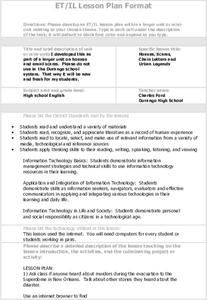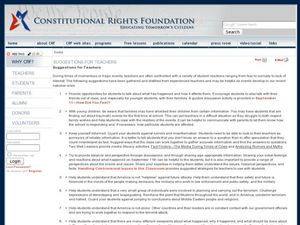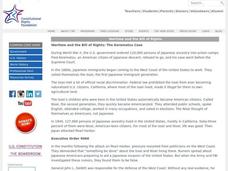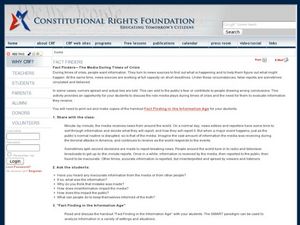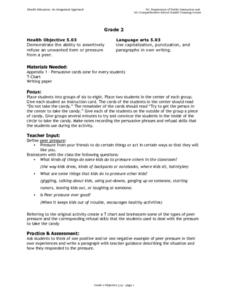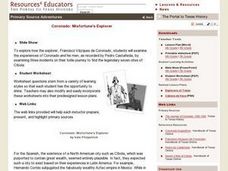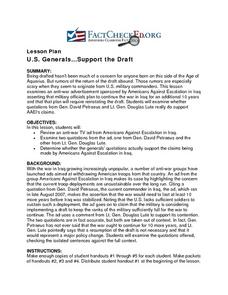Curated OER
Crispus Attucks and the Boston Massacre
Students interpret historical evidence presented in primary and secondary resources. In this Boston Massacre activity, students listen to a lecture regarding the massacre and Crispus Attucks. Students respond to discussion...
Curated OER
Power of Speech
Students practice giving compliments and using words of praise. In this vocabulary lesson, students listen to the parable Yettle's Feathers and determine ways to use speech in positive ways instead of through rumors, tattling and insults.
Curated OER
Hoaxes, Scams, Chain Letters and Urban Legends
Students explore the evacuation of New Orleans due to Hurricane Katrina. Using the internet, they research stories they may have heard and verify a story's authenticity. Students discuss rumors and urban legends. Given a worksheet,...
Curated OER
Power of Speech (Private-Religious)
Students read a story. In this speech lesson, students read Yettle's Feathers and discuss what they learned from this parable. Students discuss how the words we say have an affect on other people.
Curated OER
Suggestions for Teachers: National Crisis
Students participate in group discussions in the face of national crises. In this coping strategies instructional activity, students openly discuss their feelings regarding traumatic events. Eleven suggestions for leading discussions...
Curated OER
Wartime and the Bill of Rights: The Korematsu Case
Learners examine the balance between civil liberties and protection. In this national security lesson, students explore the Korematsu case which references the Japanese internment camps of World War II. Learners draw comparisons between...
Curated OER
Uncle Tom's Cabin
Students analyze the illustrations and cover of the book Uncle Tom's Cabin. In this Uncle Tom's Cabin lesson plan, students discuss the history elements of what they see in the illustrations and cover of the book.
Curated OER
Exploring Prejudice and Text-to-Text Relationships
Tenth graders use the novel To Kill a Mockingbird to analyze relationships in society. In this literature analysis lesson, 10th graders participate in a shoe activity where they bring in one shoe belonging to someone they know and a...
Curated OER
Land of Milk and Honey: Propaganda and the Colonies
Fourth graders explore the concept of propaganda. In this colonial settlement lesson, 4th graders examine primary resources pertaining to the settlement of North Carolina by colonists. They write a persuasive journal entry convincing a...
Curated OER
Breaking News! Hopi-Spanish Relations
Middle schoolers explore early contact between the Hopi and Spaniards. In this social studies lesson, students research the establishment of Spanish missions on Hopi lands and the influences of the Spanish on Hopi culture. Middle...
Curated OER
Response to War
Students consider responses to war. In this Iraq War instructional activity, students listen to their instructor present positive methods of responding to war.
Curated OER
The GED Test: Who Passed?
Students examine the importance of reading with understanding in order to pass the GED. In this literacy instructional activity, students discuss how important reading for understanding is in order for them to pass the GED. Students also...
Curated OER
Pass it Around
Students participate in body awareness activities by lying in a large circle and passing a ball. In this body awareness instructional activity, students lie in a large circle and pass a ball in multiple fashions to improve their motor...
Curated OER
Fact Finders—The Media During Times of Crisis
Students practice finding reputable facts. In this media awareness lesson plan, students review a handout regarding tips for evaluating media and then discover the SMART method which they use to analyze news sources and media.
Curated OER
War and the Media Fact Finders: The Media in Times of Crisis
Young scholars explore the role of the media in war reporting. In this information age lesson, students discuss how to find and disseminate factual information. Young scholars consider the source, motive, authority of information.
Curated OER
Bullying
Students recognize and respond appropriate to bullying, teasing, and aggressive behaviors. In this bullying lesson plan, students listen to stories about bullying, participate in bullying discussions, and role play various scenarios to...
Curated OER
Health Education: Peer Pressure
Second graders examine peer pressure. For this health lesson plan, 2nd graders demonstrate the ability to assertively refuse an unwanted item or pressure from a peer.
Curated OER
Coronado: Misfortune's Explorer
Fourth graders discuss the importance of Coronado's expedition through Texas and the trials his men endured during the journey. They view and discuss a map of Coronado's route, the effects of weather on the Great Plains, and Buffalo....
Curated OER
Puberty/Adolescence, Day 4: "Will I Fit in?"
What are healthy friendships? What makes a friendship unhealthy? There are several worksheets for your high schoolers to do to answer some of these questions and more about their friends and ideas about friendship. Inspire some great...
Curated OER
2011 Nobel Prize Winners Announced
This assignment has young scientists read four different news articles about the 2011 Nobel Prize winners. Six questions are posed for children to write the answers. It is a relevant activity for getting middle schoolers to meet the...
Curated OER
U.S. Generals...Support the Draft
Young scholars examine anti-war TV ads concerning the war in Iraq. They research information concerning the war, quotes made by generals, and the importance of a strong military. Students explore the possibility of enacting a draft and...
Curated OER
HIV/AIDS: Rights and Responsibilities
Eighth graders read and discuss various situations revolving around the subject of HIV/AIDS. They practice applying knowledge, solving problems, and identifying feelings around the issue of HIV. They also discuss correct condom use.
Curated OER
Privacy and the Fourth Amendment
Young scholars examine the right of privacy for individuals in a society that is changing due to technology. They examine how courts have to change the idea of privacy.
Shmoop
ELA - Literacy.CCSS.ELA-Literacy.RH.9-10.1
Do your pupils know what a primary source is? How about a secondary source? Provide them with the information here about different types of documents and then test their knowledge with a brief quiz. The quiz is made up of two documents....


